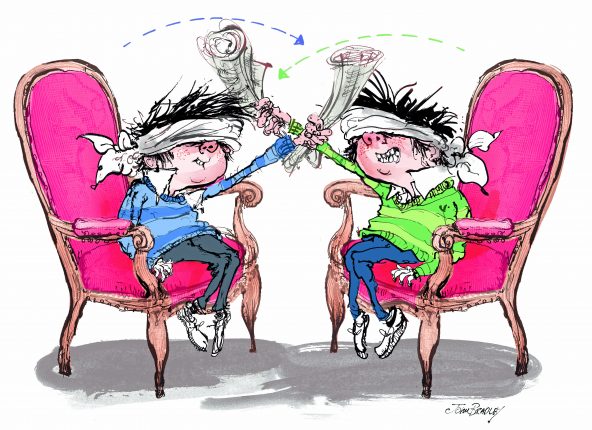Parlour games have kept generations entertained at Christmas. Whether naughty or nice they add old-fashioned family fun to the festive season.
On one cerebral festive occasion in an Irish castle I was invited to join in an incomprehensible word-play game with two Oxford undergraduates, then in full command of their intellectual plumage and prowess. They must have thought me a dunce and a dullard for, in that drowning hour, I did not get a single answer right. It was some comfort later to hear that one of them flunked university and the other only got a third-class degree. But aside from being intellectually overshadowed, there has been the odd moment of joy when it comes to Christmas parlour games.
The highly competitive Waugh family, grandchildren of Evelyn Waugh, are virtuosos at charades. My family has often been invited to the Waughs’ Devon home at Christmas to join them in this mirthful ritual. While some of the subject matter may be a little bit highbrow – one enactment of Mrs Dalloway took 20 minutes to puzzle out – I feel I added something one year as Parson Jack Russell before I tripped over the sofa, falling behind it to be left.
Charades is a staple Christmas parlour game
Charades is the staple Christmas parlour game, suitable for all ages and levels of festive showmanship. Like cod-philosophy and keeping a mistress, it was invented by the French. In its original 18th-century form, it was a literary riddle game, written in books and magazines and, for the coquettish, on the back of fans. Later in England in the 19th century it became more the acting game we recognise today, being popularised by Jane Austen, Charlotte Brontë and William Makepeace Thackeray.
Austen wrote in a letter in 1816: “Our day in Alton was very well pleasant, venison quite right, children well-behaved and Mr and Mrs Digweed taking kindly to our charades.” Several charades appear in her novel Emma. In Brontë’s Jane Eyre, a team pantomimes a marriage ceremony. Thackeray, displaying something of the chauvinism of his day, wrote of charades: “It enabled the many ladies amongst us who had beauty to display their charms, and the fewer number who had cleverness to exhibit their wit.” The height of Becky Sharp’s social rise appears in Vanity Fair when she performs before the Prince Regent.
High jinks
Today, the word charade is used to denote an inept deception or amateurish acting and that could certainly be said of the many brave souls called upon to play Are You There, Moriarty? Like many of their activities with fatuously little point, Moriarty originated in 1906 with the Boy Scouts. Its clear intention was to work off the teenage testosterone left over from tent pegging or Banged Up Benny. It could not be more simple: place two blindfolded contestants facing each other on chairs and get one to whack the other with a rolled-up newspaper.
Simple as it may sound, this parlour game can get out of hand. Once as students, we played it as a group game in the dark. One couple ended up behind a sofa knocking seven bells out of each other. “How dare you beat me with The Guardian,” the victor eventually exclaimed.

Some parlour games can be very boisterous Illustration John Bradley
Opportunities for even rougher parlour games may be had with High Cockalorum or Buck Buck. Originally a World War I military mess game, there are intriguing regional titles for it. In Birmingham it is, or was, known as Polly on the Mopstick. In the west of Scotland it is called Hunch, Cuddy, Hunch; while in Nottinghamshire it is titled Husky, Fusky, Finger or Thumb.
It involves, indoors, two teams of six lined up apart who must rush at each other and jump on their opponents’ backs or ride them like a horse. Writing about it in 1919, Birmingham-born author Charles Woodley said: “All sorts of tricks were resorted to, and it would invariably end with a heap of bodies lying on the ground, laughing hysterically.”
Football on the lawns
In 1991, I was invited to stay by the Fraser clan at Eilean Aigas, then their magical island home in the middle of the Beauly river in Invernessshire. Not only were there nightly reeling parties in different houses, which always makes Christmas go with a swing, but also daily activities. These might include a clay pigeon shoot or, for the brave, a river swim. But the high spot was a game of football on the island’s lawns.
This annual fixture would involve perhaps 20 a side, many Frasers and their guests. In the year that I was there, one uninvited guest announced that he had just been awarded a knighthood. The football was momentarily forgotten as he was unceremoniously bundled into the rhododendrons for his swank.
On another occasion, I spent Christmas with a family in Essex in the snow. To get the youth out of the house and to work off their hangovers, the family devised a treasure hunt. This might have involved taking a church brass rubbing, clues that might lead to a pub sign and other conundrums of ordinance. But this, too, had a highlight. It was to see who could go fastest on a toboggan being pulled by a Land Rover.

A Christmas cracker of a parlour game. Illustration John Bradley
Before leaving outside Christmas games, it is worth recalling another diversion I encountered in 1968, staying again in the snow in a farmhouse in what is now the middle of Milton Keynes. My mother’s third husband was a white Russian prince, keen Shot and a countryman. He took his festivities seriously, having fled the Bolsheviks. For the children there was a tug of war with a cracker longer and larger than our own size. Then he would insist on a game of fox and hounds outside, where he would chase us until we were caught. It was a diversion that would probably not be permitted today.
Party piece
But not all Christmas parlour games have to involve an expending of energy. An early article by Charles Dickens is called A Christmas Dinner. “As to the dinner, it’s perfectly delightful – nothing goes wrong, and everybody is in the very best of spirits, and disposed to please and be pleased… Grandpapa relates a circumstantial account of the purchase of the turkey… Uncle George tells stories, and takes wine, and winks at the cousins that are making love, or being made love to, and exhilarates everybody with good humour and hospitality.”
But then comes the social alarm that involves singing songs. “Grandpa not only sings his annual song with unprecedented vigour, but on being honoured with an unanimous ‘Encore!’ actually come out with a new one.” So, for any Christmas guest, it is well to have a small party piece up your sleeve.
Little Donkey
For many years, I have been the guest of Devon neighbours who offer up a lunch with more than just the trimmings. I would be called into the dining room by my host’s hunting horn for a free-range fowl, five or six side dishes, crackers from Fortnums and the finest home-grown fir tree. My host, while carving, would occasionally break into festive song, much like Uncle George in Dickens. What was my party piece? To permit the grandchildren when they clamoured “Pony!” to ride upon my back for two laps around the dining room.
For some years, this household permitted me another festive ritual. This was to lead Lily, their donkey, into the kitchen, with only once a minor slip-up on the lavatorial front. Two Christmases ago, with Lily having gone to Heaven, Clover was her replacement. “Would you ride her into the drawing room?” my host enquired.

Quite the parlour game! Illustration by John Bradley
Clover made it to the front door and then took off 300 yards at some speed where I ended up in the farmyard and dismounted. “I forgot to tell you she had not been broken in,” said my host, happily capturing this escapade on film.
Parlour games caught on film
For American-born Eleasha Sallis, whose husband Andrew has hunted several packs of foxhounds, one childhood game has remained with her all her life. It is called Hedbanz. “It is a brilliant old-school game,” says Sallis. “We would play it with my grandparents in California. There would be three generations of perhaps 14 of us around the table after Christmas lunch. You can make it as normal or as naughty as you like, and toast each round with lemonade or alcohol.”
Essentially, it is like charades but where you put a Post-it note on your forehead with a word or image on it or the name of your favourite cocktail. Then you ask: “What am I?” “We have perfected it at hunt suppers at home,” continues Sallis. “Sometimes a guest can be a bit stiff and this makes people relax and be themselves in no time.”
Missing a trick
Have Christmas parlour games had their day? Has the sport of a grumpy parent embarrassing the new son-in-law died the death? If so, then we are missing a trick of good humour, joining in and a small, twinkling star of faith. Let us leave the computer games for the other days of the year. Just before one Christmas, I went to stay with Lord Spencer at Althorp. In the hall was a huge tree and the church choir sang beautiful carols as we sat on the broad staircase steps. My daughter, then aged 10 and in a Dalmatian onesie, was allowed to sing her carols sliding down the bannister.
But there should also be a caution in taking Christmas games too far. One couple went on a pre-Christmas weekend to Amsterdam. Knowing they would be apart on Christmas Day, the boyfriend made a stocking for his partner. Nestling between the gold chocolate coins and the customary orange at the toe, was a ‘toy’ of the kind that shops in Amsterdam purvey, complete with batteries. What he did not know was that his girlfriend always opened her stocking on Christmas morning on her parents’ bed. As it burst into life, there followed an animated two minutes of ‘hunt the rampant rabbit’. Her parents did not take part.
Do you love Christmas cake? Click here to read our guide to the best fruitcakes for feasting.





